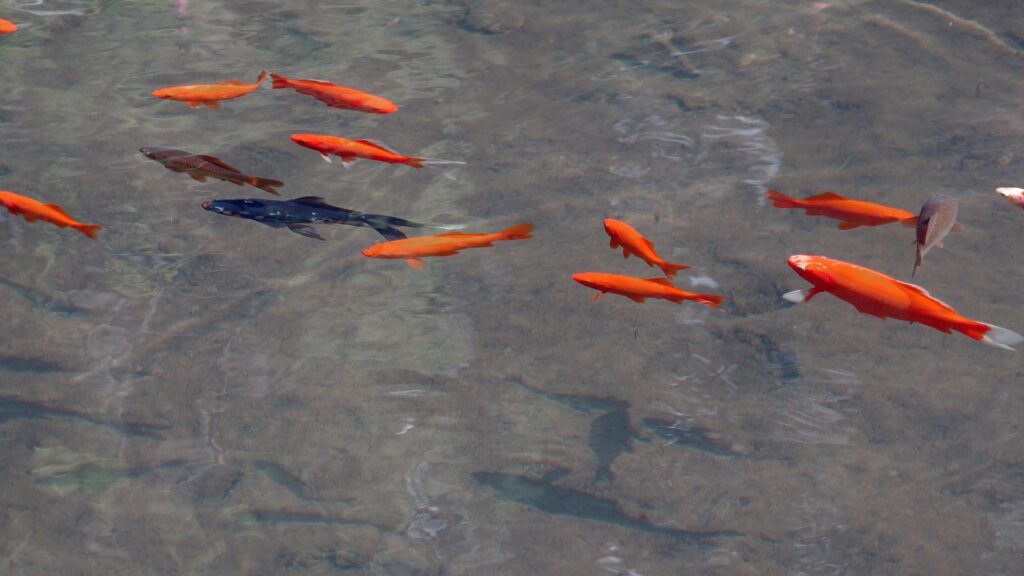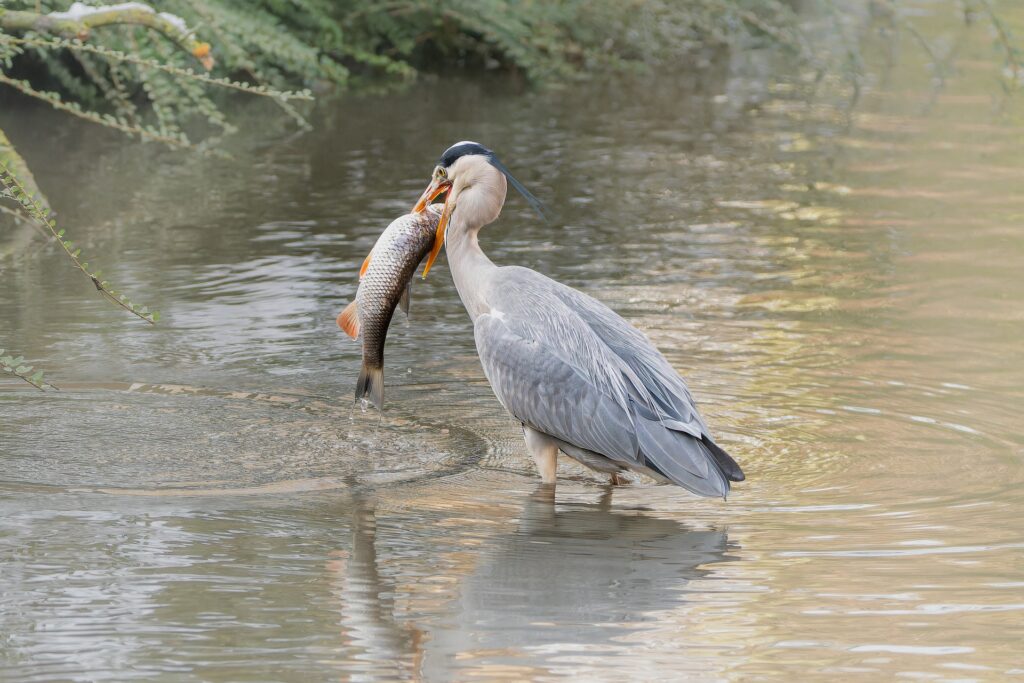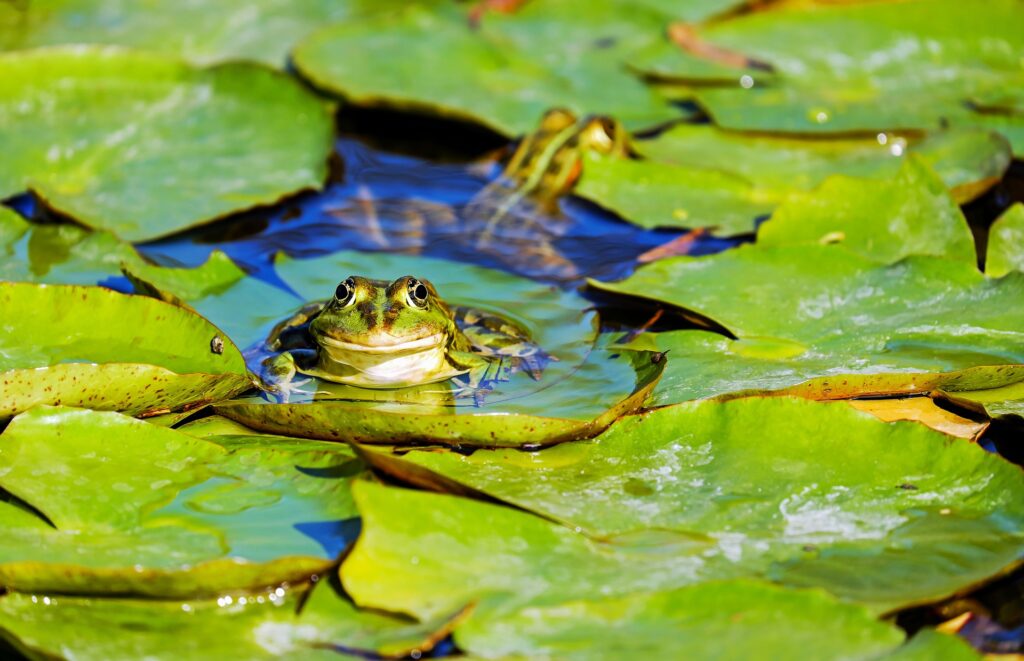As a pond keeper, have you ever wondered what animals will take fish out of ponds—those that might be sneaking into your beautiful pond to snatch away your prized fish? Today, we will explore the fascinating world of pond predators, uncovering the creatures that may be responsible for mysteriously decreasing fish populations.
From cunning raccoons to agile herons, you’ll be amazed by the variety of animals that can turn your serene pond into a battleground for survival. Join us as we dive into the intriguing world of pond predation!

Birds
One type of bird that you may encounter near ponds are herons. These majestic creatures are well-known for their long legs and necks, and they often stand still at the water’s edge, patiently waiting for fish to swim within reach. Once they spot their prey, herons swiftly strike with their sharp beaks, plucking the fish right out of the water. It’s quite a sight to see!
Another bird commonly found near ponds is the cormorant. These birds are excellent divers, and they can swim underwater for quite some time in search of fish. Cormorants have sleek bodies and webbed feet that aid them in their underwater pursuits.
Once they’ve located a fish, they resurface and swallow their catch whole. With their incredible fishing abilities, cormorants can be quite successful at depleting fish populations in ponds if they are present in large numbers.
Let’s not forget about the kingfisher, a dazzling bird species that can also be seen near ponds. These brightly colored, small birds are known for their remarkable hunting skills. Kingfishers have a unique method of catching fish – they hover above the water, diving down swiftly when they spot their prey. With their sharp beaks and keen eyesight, they are able to snatch fish right from the water’s surface. It’s truly a marvel to witness!

Otters
Otters are playful and skilled hunters that are frequently found near ponds. These furry mammals are known for their agile swimming abilities and their clever hunting techniques. Otters have a voracious appetite for fish and will stop at nothing to satisfy it. They are capable of catching fish with their nimble paws, often using rocks to crack open hard-shelled creatures. Otters may even construct dams in ponds to create a more favorable environment for their hunting pursuits. If you spot an otter near a pond, you can be sure that the fish population may be at risk!
Raccoons
Raccoons are opportunistic animals that are known for their adaptability and resourcefulness. While they are not primarily aquatic creatures, raccoons are excellent climbers and are often found near ponds where they can easily access a variety of food sources, including fish. These clever critters will use their dexterous paws to grab fish from the water or even overturn rocks and logs in search of hidden prey. Raccoons are known for their ability to adapt to different environments, so if you have a pond nearby, don’t be surprised if you spot one of these cunning creatures eyeing your fish!
Turtles
Turtles are fascinating reptiles that can be found near a variety of bodies of water, including ponds. While they may not be as quick or agile as some other predators, turtles are patient and persistent in their hunting methods. They will often bask in the sun near the water’s edge, waiting for an unsuspecting fish to swim by. Once they spot their opportunity, turtles will extend their necks and use their powerful jaws to snatch up their prey. It’s important to note that turtles can have a significant impact on fish populations, especially in smaller ponds where resources may be limited.

Frogs
Frogs are amphibious creatures that are well-known for their distinctive croaking sounds. While they may not typically be considered as fish predators, some larger frog species can indeed pose a threat to smaller fish in ponds. Frogs have long, sticky tongues that they use to catch insects, and sometimes, if a fish happens to swim too close, a frog might try its luck. It’s not a common occurrence, but in certain situations, frogs can contribute to the loss of fish in ponds.

Snakes
Snakes are often thought of as being highly skilled predators, and while this is true, their primary food source is typically not fish. However, some snake species, such as water snakes, can be found near ponds and are capable of catching fish as part of their diet. Snakes are incredibly efficient hunters, using their bodies to ambush and constrict their prey. If you have a pond, it’s important to be aware that snakes could potentially target your fish, although it may not be as common as with other predators.

Minks
Minks are small, semi-aquatic mammals that are known for their slender bodies and sharp teeth. They are excellent swimmers and are frequently found near bodies of water, including ponds. Minks have a carnivorous diet and have been known to prey on fish. With their nimble movements and adept swimming abilities, minks can be quite successful at catching fish in ponds. Their presence near a pond may indicate a potential threat to the fish population.
Muskrats
Muskrats are semi-aquatic rodents that are often associated with marshes, wetlands, and ponds. These critters are herbivores, primarily feeding on plants and vegetation. However, in certain cases, muskrats have been known to include fish in their diet.
Like otters, muskrats can also construct dens and burrows near ponds, which allow them easy access to their food sources and potential impact on fish populations. Although they may not be the first animal that comes to mind when thinking of fish predators, muskrats can still pose a threat under specific circumstances.
Cats
Cats, beloved pets in many households, are not typically associated with pond environments. While domestic cats may not directly target fish in ponds, it’s important to mention that free-roaming cats can have unintended consequences. They can try and ‘flick’ fish out of your pond. I have had a number of fish taken from my pond in the past, found hidden and half eaten. I set up a camera and caught the culprit—next door’s cat!
Cats are natural hunters, and if they have access to a pond area, they may catch fish or other small aquatic creatures. It’s essential to keep this in mind and manage cat populations responsibly to reduce any potential impact they may have on the fish populations in ponds.
Humans
Lastly, we come to humans. While we may not be considered wild animals, we do play a significant role in the wellbeing of pond fish populations. Fishing is a popular recreational activity, and it’s not uncommon for people to fish in ponds.
Whether it’s catch and release or taking fish for consumption, human involvement in pond ecosystems can have both positive and negative impacts on fish populations. It’s vital to practice responsible fishing techniques and adhere to local regulations to ensure the sustainable management of fish populations in ponds.
What Animals Will Take Fish Out Of Ponds
In conclusion, there are several animals that can potentially take fish out of ponds. Whether it’s the skilled heron, the agile otter, or even the quiet snake, each creature has its own unique way of hunting fish. It’s important to be aware of these potential predators and their impact on fish populations when enjoying and managing ponds.
By understanding and respecting the delicate balance of these ecosystems, we can strive to coexist with these creatures and ensure the long-term health and sustainability of our precious aquatic environments.
So, now you know how to protect those beautiful fish in your pond! If you need more information, take a look at ‘How Deep Does A Fishpond Need To Be To Keep Fish Alive‘.
